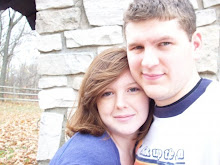
So, I've been thinking a lot about babies lately. Yes, babies. My husband's and my first niece was born this past Wednesday. Her name is Brianne Grace and she is so adorable! I sat down in the hospital room to hold her and my brother-in-law said, "We should put you in a hospital gown and send a picture to your mom."
Then when my husband held her (a beautiful picture, I have to admit--see for yourself above), the same brother-in-law said to me, "Brittani, this is where you tell him to get comfortable with it." Then I ran into one of my dad's friends on my way to class the other day and he asked, out of the blue, if I had any plans for getting pregnant.
My question is, What is the deal?!
Nate and I DEFINITELY want kids, but we also DEFINITELY don't want them anytime soon. We've been married only seven months, I'm still going to school, and we are nowhere near financially ready. We'll get a dog first, wait a couple of years, and then start to seriously consider having children.
But with all of this talk of babies and kids, and being the lover of reading that I am, the thought occurred to me that I do want our future kids to love to read. And to foster that, I plan to read to them a lot when they are young.
And this brings me to a poem that I didn't know until last year, but I love it as a fun children's poem. It's by Lewis Carroll and is called Jabberwocky. It's a little lengthy, but I inserted it below:
`Twas brillig, and the slithy toves
Did gyre and gimble in the wabe:
All mimsy were the borogoves,
And the mome raths outgrabe.
"Beware the Jabberwock, my son!
The jaws that bite, the claws that catch!
Beware the Jubjub bird, and shun
The frumious Bandersnatch!"
He took his vorpal sword in hand:
Long time the manxome foe he sought --
So rested he by the Tumtum tree,
And stood awhile in thought.
And, as in uffish thought he stood,
The Jabberwock, with eyes of flame,
Came whiffling through the tulgey wood,
And burbled as it came!
One, two! One, two! And through and through
The vorpal blade went snicker-snack!
He left it dead, and with its head
He went galumphing back.
"And, has thou slain the Jabberwock?
Come to my arms, my beamish boy!
O frabjous day! Callooh! Callay!'
He chortled in his joy.
`Twas brillig, and the slithy toves
Did gyre and gimble in the wabe;
All mimsy were the borogoves,
And the mome raths outgrabe.
Then when my husband held her (a beautiful picture, I have to admit--see for yourself above), the same brother-in-law said to me, "Brittani, this is where you tell him to get comfortable with it." Then I ran into one of my dad's friends on my way to class the other day and he asked, out of the blue, if I had any plans for getting pregnant.
My question is, What is the deal?!
Nate and I DEFINITELY want kids, but we also DEFINITELY don't want them anytime soon. We've been married only seven months, I'm still going to school, and we are nowhere near financially ready. We'll get a dog first, wait a couple of years, and then start to seriously consider having children.
But with all of this talk of babies and kids, and being the lover of reading that I am, the thought occurred to me that I do want our future kids to love to read. And to foster that, I plan to read to them a lot when they are young.
And this brings me to a poem that I didn't know until last year, but I love it as a fun children's poem. It's by Lewis Carroll and is called Jabberwocky. It's a little lengthy, but I inserted it below:
`Twas brillig, and the slithy toves
Did gyre and gimble in the wabe:
All mimsy were the borogoves,
And the mome raths outgrabe.
"Beware the Jabberwock, my son!
The jaws that bite, the claws that catch!
Beware the Jubjub bird, and shun
The frumious Bandersnatch!"
He took his vorpal sword in hand:
Long time the manxome foe he sought --
So rested he by the Tumtum tree,
And stood awhile in thought.
And, as in uffish thought he stood,
The Jabberwock, with eyes of flame,
Came whiffling through the tulgey wood,
And burbled as it came!
One, two! One, two! And through and through
The vorpal blade went snicker-snack!
He left it dead, and with its head
He went galumphing back.
"And, has thou slain the Jabberwock?
Come to my arms, my beamish boy!
O frabjous day! Callooh! Callay!'
He chortled in his joy.
`Twas brillig, and the slithy toves
Did gyre and gimble in the wabe;
All mimsy were the borogoves,
And the mome raths outgrabe.
Carroll was brilliant with this poem. It's composed of made-up words that no one really knows the meaning of (Carroll himself probably didn't know), and yet somehow, we're able to get a meaningful story out of it--a story that is so fun to read! I love reading it out loud just to see how the nonsense words roll of my tongue.
If you have kids, consider having some fun by reading them Jabberwocky. If you don't have kids, you can still have fun and read it yourself :)
